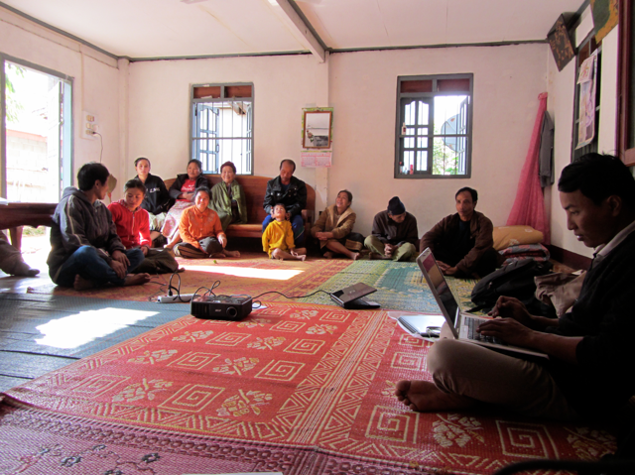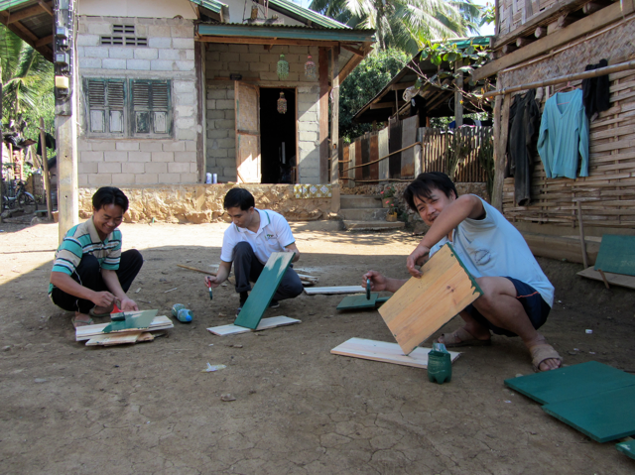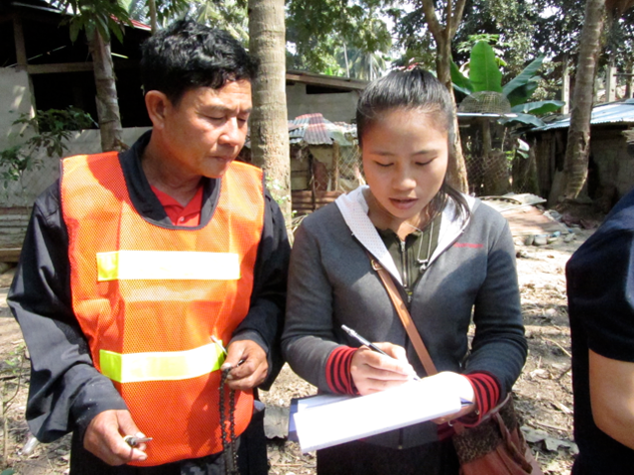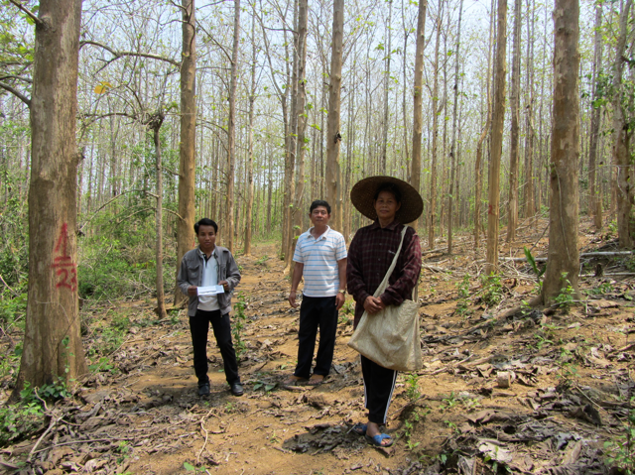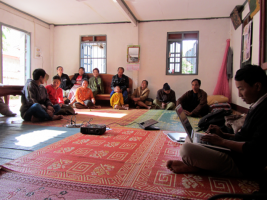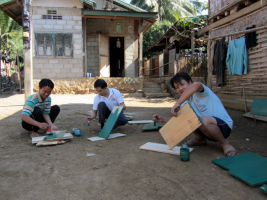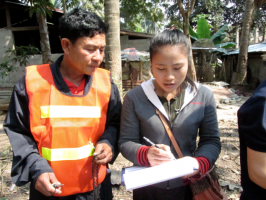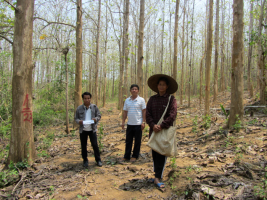Certification FSC et gestion durable de la forêt de teck dans la région de Luang Prabang (en anglais)
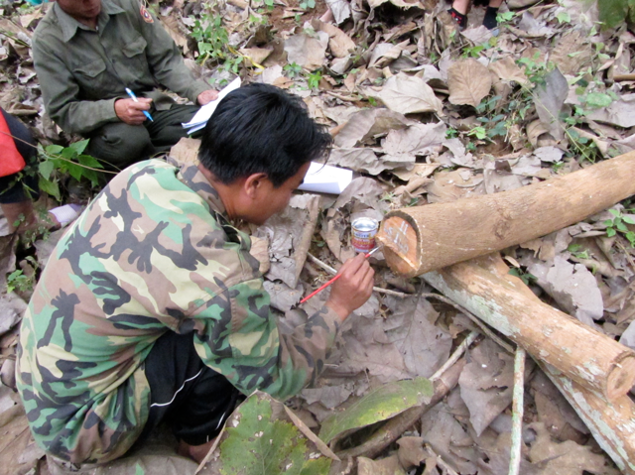
Laos has around 13 million hectares of forest, over half the country’s surface area. Almost 80% of its inhabitants make daily use of forest products for subsistence. The government is concerned about excessive deforestation and illegal timber trafficking to Thailand and has launched an extensive program to promote sustainable forest management.
Main objective
To enable a broad community program to be set up for sustainable forest management, building on the success of the Ban Kok Ngiew pilot project, with the aim of obtaining FSC (Forest Stewardship Council) certification and establishing links with potential buyers of FSC certified products on the international markets.
Specific objectives
To provide village communities in Pousang with the technical support needed on the ground to set up a cooperative and to manage their forests sustainably.
To put these communities in touch with buyers of responsible teak on the international market, thereby ensuring them a higher and more sustainable income.
Project monitoring/evaluation process
- Four narrative and financial reports
- Foundation visits in November 2012 by Olivier Braunsteffer and in January 2014 by Jacqueline Délia Brémond
- Mid-term internal evaluation in January 2013
- Independent final evaluation in June 2014
Results and indicators
- 400 hectares of land are mapped and registered. (100%)
- Tad Sae conservation area has been mapped (15ha), and teak plantations within the area (5ha) also mapped. (100%)
- Price of teak increased by 60%. (60%)
- 30% attendees of all trainings are women (98%) and 23% of all farmer leaders are women (63%)
- The project is formally involved in the Government Forestry Strategy Program. (100%)
- A responsible forestry guide and Standard Operating Procedures (SOPs) are shared will all members, distributed among them and available at the office of Ban Kok Ngiew. (100%)
- 7 new villages (174%) and 370 new households (148%) have joined LPTP FCS Group.
- 624 Forest Management Plans have been established. (208%)
- 624 new teak plantations are registered (208%)
- 7 farmer groups are fully established (175%) and 27 new teak farmer leaders have been elected.
- 11 training sessions on responsible forest management (110%), 13 on sales and teak markets (130%), 18 on FSC certification (180%), 11 on environmental aspects (110%) have been conducted.
- 100% of farmer sold timber by cubic meter and not logs
- The Current Annual Allowable cut is 1530m3 (153%)
- 86 m3 sold per year (17%)
- Irregular sales to 3 buyers (66%)
Comments
The project encountered major difficulties in marketing the certified wood. On the international market, the cost of transporting the wood to factories in Vietnam is too high for the low volumes concerned. On the local market, there is competition from illegal logging. It is therefore necessary to continue ongoing efforts to increase the volume of wood for export.
TFT will continue its support for the producers until at least the end of 2016.
Sustainability of the actions undertaken
Extract from the final evaluation by Oliver Schönweger in June 2014
« The program is well supported by the Government and even if TFT were to phase out its engagement with the LPTP, DOF (Department of Forestry) and PFS (Provincial Forestry Section) would most probably find donors and support to continue either the program or its main activities. TFT is currently looking at a minimum extension of the LPTP until mid-2016 when the situation will be reassessed and a decision made on the type of support required and the interventions for its implementation. The viability of the TFGs (Teak Farmer Groups) depends on their ability to supply the market regularly in order for the wood buyers to be able to meet their customers’ orders. However, under the current structure, which relies on the sale of FSC wood, wood sales are not regular. According to Stuart Ling (personal communication) member interest is even declining. These two issues are the biggest challenges in terms of program sustainability. In order to overcome these, the program must concentrate on scaling-up in terms of members and Annual Allowable Cut (AAC) volume. The program must continue to support the government of the Lao PDR to further simplify and shorten the lengthy and complex processes for legal wood transactions as well as reducing the high processing and transport costs undermining price competitiveness. Increased awareness of existing policies and laws at all levels of government has to be further built-up in order to encourage and sustain TFGs. To create the bigger leverage required to trigger the necessary changes close collaboration with DOF, Ministry of Finance, Chamber of Commerce and Industry and JICA (and eventually other donors such as IFAD, FAO, GIZ etc.) will be required. Last but not least, the program must further assist farmers to find buyers, especially buyers of small-sized wood from thinning. Different types of wood processing (either just squaring logs or producing furniture) may all provide additional chances to open up new markets locally and internationally. The market for FSC teak is irregular, and there are doubts as to whether the FSC will survive in an international market that is demanding “only” legal, rather than FSC wood. As the yearly FSC audits are costly, complex and time consuming the benefits of FSC certification should be scrutinized and eventually put on hold until the market demand for FSC wood is more favorable. It is also very doubtful that government officials would have the time and skills (also in terms of English skills) required to prepare all the complex and demanding documentations required for such audits. It is recommended that the LPTP should include all village teak producers within the TFGs and aim to obtain the best deal for farmers, regardless of who the final buyer is (FSC or just legal wood buyers). The program is and will remain heavily reliant on donor funding until wood is sold in larger volumes and more regularly.
Conclusion de l’évaluation finale
The LPTP project has led to remarkable achievements in the improved management of teak plantations and better environmental protection. The program has increased awareness and knowledge among farmers and governmental officials regarding forest and environmental management, Forest Stewardship Council (FSC) certification, teak markets and wood sales. The LPTP has enabled district officials and farmer groups to manage wood sales and to register legal wood independently. All those achievements are important steps for the Lao PDR in the enhancement of its competitiveness and satisfying the evolving international wood market requirements. The program was designed to be consistent with and supportive of government policies and strategies towards environmental protection, tree plantation expansion and general development objectives. A crucial asset is the good reputation gained by the LPTP amongst government, partners and society. In addition, there is a great potential for the model piloted and implemented by the project to be up-scaled to other provinces.
-
Effectiveness, ranking: 3 satisfactory rating (positive results predominate)
-
Impact, ranking: 2 good rating (no significant defects/no negative impacts)
-
Satisfaction of beneficiaries, ranking: 2 good rating (no significant defects/no negative impacts)
-
Efficiency, ranking: 2 good rating (no significant defects/no negative impacts)
-
Appropriateness and relevance, ranking: 1 very good rating
-
Sustainability, ranking: 2 good rating (no significant defects/no negative impacts)
Although two major challenges have emerged, these have already been identified by the LPTP team and the first steps in addressing them are underway. Nonetheless, these challenges will need to be addressed sooner rather than later in order to facilitate a more effective and sustainable program management and to safeguard the sustainability of the current achievements in the long term. The two most important constraints identified are the lack of buyers and until recently the very low volume of timber which groups could provide to the market. Recent volumes achieved are more attractive to buyers, but further increases are still necessary. The lack of an updated Strategic Business Plan means that such a plan needs to be in place soon. An abrupt termination of support – as unlikely as it is – would seriously endanger the sustainability of the training results, and of the awareness and maintenance of the established farmer groups. It is very likely that the GoL will continue the program and find new funding, but it is unlikely that the relevant GoL agencies could handle the extension into new districts and villages or tackle both of the main challenges without the LPTP-TFT’s support and network. »
Although two major challenges have emerged, these have already been identified by the LPTP team and the first steps in addressing them are underway. Nonetheless, these challenges will need to be addressed sooner rather than later in order to facilitate a more effective and sustainable program management and to safeguard the sustainability of the current achievements in the long term. The two most important constraints identified are the lack of buyers and until recently the very low volume of timber which groups could provide to the market. Recent volumes achieved are more attractive to buyers, but further increases are still necessary. The lack of an updated Strategic Business Plan means that such a plan needs to be in place soon. An abrupt termination of support – as unlikely as it is – would seriously endanger the sustainability of the training results, and of the awareness and maintenance of the established farmer groups. It is very likely that the GoL will continue the program and find new funding, but it is unlikely that the relevant GoL agencies could handle the extension into new districts and villages or tackle both of the main challenges without the LPTP-TFT’s support and network. »
Conclusions of the ex-post visit (May 2018)
Since the funding from Fondation Ensemble, this relevant project has grown significantly and has achieved important results with 25 villages involved in the program in 2018, 628 TFG members, and 980 lots covering a global area of 720 ha. But it is clear that the sales of wood were much lower than the objectives (goal of annual 500 m3, during the project of the Fondation Ensemble): in fact, sales of LPTP wood (2009-2017) represented only a volume of 1,041 m3 for a value of $ 132,000. As the FSC teak sector had not taken off during this 10-year period, the decision was made, in 2016, by PFS (Luang Prabang Provincial Forestry Section) and TFT not to extend the FSC (Forest Stewardship Council) certificate for LPTP but systems were maintained in the villages.
FSC (Forest Stewardship Council) was a relevant guideline to improve forest management for the farmer groups however, the certification for smallholders is complex, not economical (prohibitive costs of FSC audits cannot be covered) and does not guarantee a reliable market. FSC is not necessary for good marketing – LPTP now provides a strong due diligence system for wood sales. However, the logic of the FSC certification has made possible the organization and the technical and commercial training of producers who are now aware of environmental issues. This quality frame must be, therefore, maintained, especially since it can be easily adapted if a demand for FSC wood appears in the future. But the project will rely on donor funding as long as the timber is not sold in larger quantities and more regularly.

